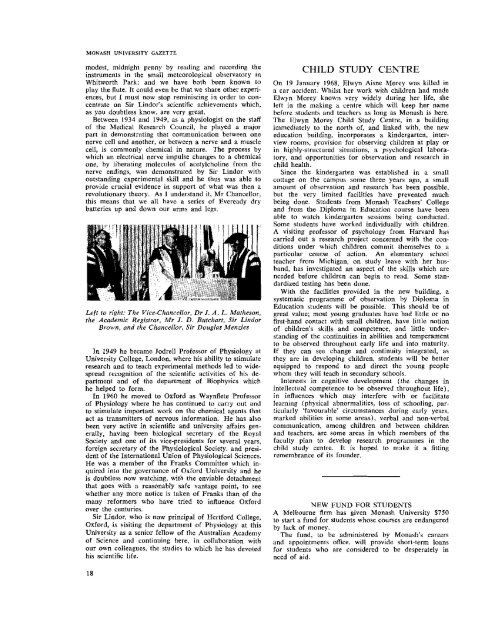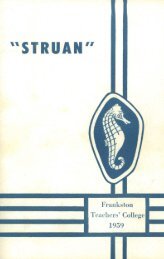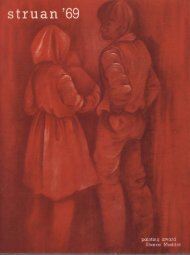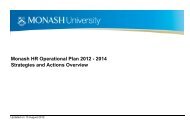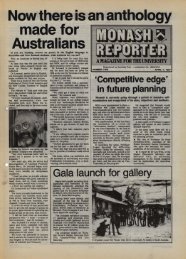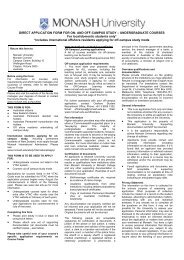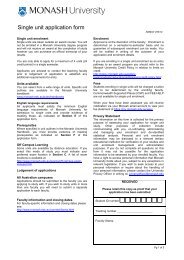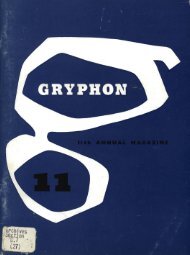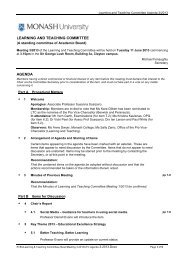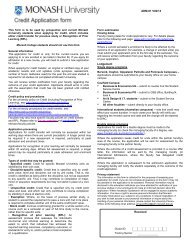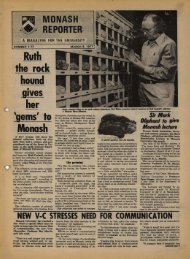Volume 6 Number 1 - Adm.monash.edu - Monash University
Volume 6 Number 1 - Adm.monash.edu - Monash University
Volume 6 Number 1 - Adm.monash.edu - Monash University
Create successful ePaper yourself
Turn your PDF publications into a flip-book with our unique Google optimized e-Paper software.
MONASH UNIVERSITY GAZETTE<br />
modest, midnight penny by reading and recording the<br />
instruments in the small meteorological observatory in<br />
Whitworth Park: and we have both been known to<br />
play the flute. It could even be that we share other experiences,<br />
but I must now stop reminiscing in order to concentrate<br />
on Sir Linder's scientific achievements which,<br />
as you doubtless know, are very great.<br />
Between 1934 and 1949, as a physiologist on the staff<br />
of the Medical Research Council, he played a major<br />
part in demonstrating that communication between one<br />
nerve cell and another, or between a nerve and a muscle<br />
cell, is commonly chemical in nature. The process by<br />
which an electrical nerve impulse changes to a chemical<br />
one, by liberating molecules of acetylcholine from the<br />
nerve endings, was demonstrated by Sir Lindor with<br />
outstanding experimental skill and he thus was able to<br />
provide crucial evidence in support of what was then a<br />
revolutionary theory. As I understand it, Mr Chancellor,<br />
this means that we all have a series of Eveready dry<br />
batteries up and down our arms and legs.<br />
Left to right: The Vice-Chancellor, Dr J. A. L. Matheson,<br />
the Academic Registrar, Mr J. D. Butchart, Sir Linder<br />
Brown, and the Chancellor, Sir Doug/as Menzies<br />
In 1949 he became Jodrell Professor of Physiology at<br />
<strong>University</strong> College, London. where his ability to stimulate<br />
research and to teach experimental methods led to widespread<br />
recognition of the scientific activities of his department<br />
and of the department of Biophysics which<br />
he helped to form.<br />
In 1960 he moved to Oxford as Waynflete Professor<br />
of Physiology where he has continued to carry out and<br />
to stimulate important work on the chemical agents that<br />
act as transmitters of nervous information. He has also<br />
been very active in scientific and university affairs generally,<br />
having been biological secretary of the Royal<br />
Society and one of its vice-presidents for several years,<br />
foreign secretary of the Physiological Society. and president<br />
of the lnternational Union of Physiological Sciences.<br />
He was a member of the Franks Committee which inquired<br />
into the governance of Oxford <strong>University</strong> and he<br />
is doubtless now watching, with the enviable detachment<br />
that goes with a reasonably safe vantage point, to see<br />
whether any more notice is taken of Franks than of the<br />
many reformers who have tried to influence Oxford<br />
over the centuries.<br />
Sir Linder, who is now principal of Hertford College,<br />
Oxford, is visiting the department of Physiology at this<br />
<strong>University</strong> as a senior fellow of the Australian Academy<br />
of Science and continuing here, in collaboration with<br />
our own colleagues, the studie s to which he has devoted<br />
his scientific life.<br />
CHILD STUDY CENTRE<br />
On 19 January 1968, Elwyn Aisne Morey was killed in<br />
a car accident. Whilst her work with children had made<br />
Elwyn Morey known very widely during her life, she<br />
left in the making a centre which will keep her name<br />
before students and teachers as long as <strong>Monash</strong> is here.<br />
The Elwyn Morey Child Study Centre, in a building<br />
immediately to the north of, and linked with, the new<br />
<strong>edu</strong>cation building, incorporates a kindergarten, interview<br />
rooms, provision for observing children at play or<br />
in highly-structured situations, a psychological laboratory,<br />
and opportunities for observation and research in<br />
child health.<br />
Since the kindergarten was established in a small<br />
cottage on the campus some three years ago, a small<br />
amount of observation and research has been possible,<br />
but the very limited facilities have prevented much<br />
being done. Students from <strong>Monash</strong> Teachers' College<br />
and from the Diploma in Education course have been<br />
able to watch kindergarten sessions being conducted.<br />
Some students have worked individually with children.<br />
A visiting professor of psychology from Harvard has<br />
carried out a research project concerned with the conditions<br />
under which children commit themselves to a<br />
particular course of action. An elementary school<br />
teacher from Michigan, on study leave with her husband,<br />
has investigated an aspect of the skills which are<br />
needed before children can begin to read. Some standardized<br />
testing has been done.<br />
With the facilities provided in the new building, a<br />
systematic programme of observation by Diploma in<br />
Education students will be possible. This should be of<br />
great value; most young graduates have had little or no<br />
first-hand contact with small children. have little notion<br />
of children's skills and competence, and little understanding<br />
of the continuities in abilities and temperament<br />
to be observed throughout early life and into maturity.<br />
If they can see change and continuity integrated, as<br />
they are in developing children, students will be better<br />
equipped to respond to and direct the young people<br />
whom they will teach in secondary schools.<br />
Interests in cognitive development (the changes in<br />
intellectual competence to be observed throughout life),<br />
in influences which may interfere with or facilitate<br />
learning (physical abnormalities, loss of schooling, particularly<br />
'favourable' circumstances during early years,<br />
marked abilities in some areas), verbal and non-verbal<br />
communication, among children and between children<br />
and teachers, are some areas in which members of the<br />
faculty plan to develop research programmes in the<br />
child study centre. It is hoped to make it a fitting<br />
remembrance of its founder.<br />
NEW FUND FOR STUDENTS<br />
A Melbourne firm has given <strong>Monash</strong> <strong>University</strong> $750<br />
to start a fund for students whose courses are endangered<br />
by lack of money.<br />
The fund, to be administered by <strong>Monash</strong>'s careers<br />
and appointments office. will provide short-term loans<br />
for students who are considered to be desperately in<br />
need of aid.<br />
18


